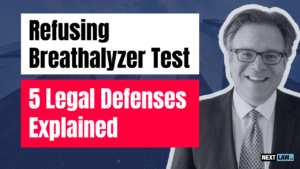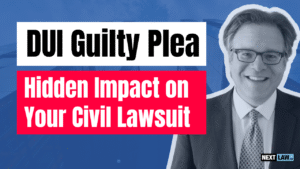
Refusing a Breathalyzer Test: 5 Legal Defenses Explained
A breathalyzer test refusal is a serious DUI criminal charge, but understanding your legal options is crucial. We regularly see cases where specific legal defences


The Ontario
DUI Arrest Test™
The 60-Second Ontario DUI Arrest Test assesses the nature of the arrest in order to determine if your charges may get withdrawn.
Your ability to avoid a Criminal Record depends on what comes next. I’ll explain everything about your DUI charge and develop a strategy that will change everything – FREE!
There are three core DUI, Over 80 Charge, Drinking and Driving, Impaired Driving and Refusing Breathalyzer laws in Ontario that the Police can charge you with.
These three charges are criminal charges and are defined under the Criminal Code of Canada.
The most common drunk driving charge is a DUI charge known as an Over 80 Charge.
This means that the Police believe you were operating a vehicle with an alcohol level greater than 80 mg of alcohol per 100 mL of blood.
This means that the Police believe your operation of a vehicle was impaired by Alcohol or Drugs.
You do not need to have a blood-alcohol level above 80 mg. In other words, you can still be charged and found guilty of this DUI charge even if your breath samples were below the legal limit.
You do not need to have any alcohol in your system. In other words, you can still be charged and found guilty of this DUI charge if the Crown can prove that your impaired operation of the vehicle was due to drugs in your system.
This means that the Police believe you refused to take a breathalyzer test.
There are two situations in which the Police lay this charge.
DUI related offences (such as Drinking and Driving / Over 80, or Impaired Driving by Alcohol or Drugs, or Refuse Breathalyzer) are defined in the Criminal Code of Canada.
The Criminal Code of Canada is a federal law. In other words, these charges under the Criminal Code apply to every person across Canada.
However, there are provincial laws that also cover DUI related offences. In Ontario, these laws are defined in the Highway Traffic Act. When you are charged under the Criminal Code, you may also be charged with offences under the Highway Traffic Act.
If you are convicted of a DUI, Drunk Driving, Over 80 charge (whether you entered a guilty plea or were found guilty after a trial), you will face a series of serious penalties.
However, the Judge is not free to do whatever he or she wants. The Judge must follow specific sentencing guidelines.
There are minimum sentences that the Judge must give you. And conversely, there are maximum limits to what the Judge can impose against you.
Generally, it’s between the minimum and maximum penalties where the Judge has flexibility in the penalties you face.
The minimum sentences you will face depends on whether you have been convicted of the DUI charge before:
The maximum sentences you will face will depend on how the Crown intends to prosecute your case. And whether someone was hurt or killed as a result of your DUI.
Both federal and provincial driving suspensions – You will face a driving prohibition not only from the Criminal Code of Canada (which is federal law) but you will be facing a license suspension under provincial law.
You may be subject to civil lawsuits – If you hurt or killed another person in the context of your DUI charge, that other party may launch a civil lawsuit against you.
In the criminal context, the burden of proof is beyond a reasonable doubt. However, in a civil lawsuit context, that burden of proof is only a “balance of probabilities” – which is significantly less than the criminal context. Because you were convicted in a criminal context, you will most likely lose any civil case against you.
Your insurance will dramatically increase – Your DUI conviction will place you in a high-risk category. And if you can drive again, the cost to get insurance will increase significantly.
You may be summoned to any of the following courts across Ontario:
Cobourg, Guelph, Brockville, Brampton, Burlington, Cayuga, Ottawa, Napanee, Owen Sound, Sarnia, Leamington, Sault Ste Marie, Thunder Bay, Oshawa, Peterborough, Toronto, Kingston, Orillia, Barrie, Sudbury, St. Catharines, Bradford, Belleville, Parry Sound, Orangeville, Hamilton, Stratford, Ontario, Woodstock, Bracebridge, Kitchener, London, Timmins, Newmarket, Welland, Windsor
To get the best outcome for your DUI charge, it’s important to know the people involved in my DUI case.
Our criminal justice system works like a “boxing match” or “MMA fight.”
Our court system is designed to have two people fighting it out with a referee to make sure each side is following the rules. And, in many cases, that referee will also decide on the outcome of your case.
There are 3 important people that matter in your DUI case.
In some cases (more serious DUI charges), the fourth important person would be a Jury that would hear the case against you and decide whether you are guilty or not guilty.
These 3 important people each have an important role in your DUI case.
In criminal court, your case will be overseen by a Judge.
The Judge is NOT advocating for you.
The Judge is NOT advocating for the Crown.
The Judge is like a referee. The Judge is there to make sure that all the rules are being followed.
And, most of the time, the Judge will be the one who decides whether you are guilty or not.
The most important thing to remember with any criminal charge – whether you’ve been charged with Drinking and Driving / Over 80, or Impaired Driving by Alcohol or Drugs, or Refuse Breathalyzer — is that you are presumed innocent.
The criminal charges against you will take time. The legal process does not happen overnight. However, the courts cannot take forever to prosecute the case against you.
As your criminal case proceeds through the court system in Ontario, you will face a series of court dates that include:

The first time you will appear in court for your Drinking and Driving / Over 80, Impaired Driving by Alcohol or Drugs, or Refuse Breathalyzer charge is at a court date called your “First Appearance.”
Your First Appearance is not a trial.
The Police officer does not need to be there.
Your First Appearance is the first time you appear before the court. And here’s what’s going to happen.
If you have hired a lawyer, then no. You do not need to attend your First Appearance because your lawyer will attend on your behalf.
If you have not hired a lawyer, then yes. You will need to attend your First Appearance.
No. The Police Officer is not required to be at your First Appearance. If your case goes to trial, then yes, the Police Officer that charged you will be called upon to give the evidence that he or she has against you.
Disclosure is all the evidence that the Crown will use against you as they try to convict you on your DUI charges.
Disclosure includes all the Police Officer notes, witness statements, and technical documents including the notes from the breathalyzer technician.
Yes.
And, it’s important to know that the disclosure you get at your First Appearance may not be complete.
And it is critical to get complete disclosure to properly assess your case’s strengths and weaknesses to mount an effective defence.
The Crown needs to prove the DUI charges against you beyond a reasonable doubt. Your Lawyer’s job to introduce reasonable doubt.
There may be technical issues with the device – perhaps the machine did not function properly, or someone did not properly maintain the device.
It’s possible.
The Crown (the Lawyer representing Canada’s government and is responsible for prosecuting the DUI charge) can only proceed with the charges against you based on passing these two tests.
Test #1: Is it in the public interest to pursue the DUI charges against you?
Test #2: Is there a reasonable prospect of a conviction?
No.
The fact that you have never been charged before does not matter.
The fact that you are an outstanding citizen does not matter.
The only way the DUI charges against you will be withdrawn is in the event there are significant problems in the Crown’s case.
And, these significant problems are so severe that there is no responsible prospect of a conviction. Only then will the DUI charges against you get withdrawn.
The Charter of Rights and Freedoms, known as the Charter, sets out those rights and freedoms that Canadians believe are necessary for a free and democratic society.
The Charter is one part of the Canadian Constitution. The Constitution is a set of laws containing the basic rules about how our country operates.
The Charter is important because it protects basic rights and freedoms essential to keeping Canada a free and democratic society.
And these aren’t just words. These words have real power and real meaning.
Now the charter has 34 sections.
There have been thousands of cases that have gone to court to interpret the meaning of the charter.
Lawyers rely heavily on Charter defences in DUI cases.
Here are some common examples.
If a Lawyer can establish that there were no “reasonable and probable grounds” for the arrest, then the DUI charge would get withdrawn.
The Charter recognizes that you have a right for your case to be heard at trial in a reasonable period of time.
The longer your case drags on, not only does the uncertainty cause stress in your life, the evidence surrounding your case may get ‘dated’ and may cause harm to you being able to mount a proper legal defence.
For these reasons, the Charter requires that your case proceeds to trial within a reasonable period of time. If your case drags on beyond these time limits, it may be possible to get your case withdrawn.
One of the most important issues people face when convicted of a DUI is, “how can you get your driver’s license back?”
To understand how to get driving again, you first need to understand the driving prohibitions you will face.
For a first conviction, the minimum driving prohibition will be 12-months.
For a second conviction, the minimum driving prohibition will be 24-months.
For a third conviction, the minimum driving prohibition will be 36-months.
When convicted of a DUI, the Ontario government requires that you complete the “Back on Track” program.
The “Back on Track” program is a remedial program to teach you about myths and facts about alcohol and drugs in the context of operating a vehicle. The goal of the program is to prevent you from committing DUI crimes in the future.
If you do not complete the “Back on Track” program, you will not be able to get your license back.
You will need to go to the Ontario Ministry of Transportation and apply to get your driver’s license back.
The Ontario Ministry of Transportation will confirm that you have completed the “Back on Track” program.
Yes.
90-days from the date you were charged with a DUI, you can go to the Ministry of Transportation of Ontario and pay the license reinstatement fee. Assuming you do not have any other restrictions on your driver’s license, then you can get your license back.
You will be able to drive until the conclusion of your trial. If you win at your trial, you will keep driving. However, if you lose at trial, you will have to surrender your driver’s license for the time period determined by the Judge.
Short answer. Most likely, no.
Here’s the longer answer.
In Ontario, if you enter a guilty plea to your DUI, you may be able to participate in the Ontario Ignition Interlock Program.
The conditions to be eligible for this program include:
If you meet these conditions, you can start to drive again after 90-days with an interlock device installed in your vehicle.
The advantage of agreeing to the Ontario Ignition Interlock Program is that you will be able to drive again (with the interlock device) 90-days after you plead guilty. So you will “save” 9-months of a driving prohibition.
The disadvantage of agreeing to the Ontario Ignition Interlock Program is that you will enter a guilty plea, which means you will get a criminal record. And, with a DUI conviction on your driving record, you will be subject to significant insurance rate increases.
In contrast, if you fight the DUI charge and win, you walk away as if you were never charged before. And, all the evidence against you gets destroyed.
Bottom line. There is not a lot of benefit to participating in the Ontario Ignition Interlock Program. You are likely better off fighting the DUI charge.
The most effective way to fight the charge is to hire an experienced lawyer. The results of your DUI / Impaired charges rest with analyzing your disclosure or evidence, speaking with the prosecutor and determining the next steps. An experienced legal professional knows best how to navigate the complex court system to minimize the penalties for your charges.
An Impaired Driving charge is a very damaging conviction, resulting in a criminal record. For employers, this is a serious charge to have when applying to or trying to keep current employment.
Generally, it will remain unless you apply for a pardon, and this could take years, decades, or more
In order to get your charges dropped, there would have to be a fatal error in the Crown disclosure or evidence. If this is the case, a legal professional would argue to have the charges dismissed.

A breathalyzer test refusal is a serious DUI criminal charge, but understanding your legal options is crucial. We regularly see cases where specific legal defences

Have you been turned away at the U.S. border? Or perhaps you know your record prevents you from traveling to the United States and you’re

A DUI charge involving an accident isn’t just about criminal penalties – it’s about facing two distinct legal battles that could impact your future in

When you’re arrested for DUI, understanding your rights can make a critical difference in your case. One of the most fundamental yet often misunderstood rights

For many Ontarians facing a pending DUI charge, the prospect of crossing the U.S. border can be daunting and confusing. The intersection of legal principles

Getting charged with a DUI in Ontario often comes with additional traffic tickets under the Highway Traffic Act. While paying these tickets immediately might seem